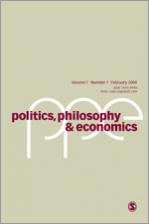

"Distributive and Relational Equality".
Politics, Philosophy, and Economics 11 (2012), 123-148.
Is equality a distributive value or does it rather point to the quality of social relationships? This article criticizes the distributive character of luck egalitarian theories of justice and fleshes out the central characteristics of an alternative, relational approach to equality. It examines a central objection to distributive theories: that such theories cannot account for the significance of how institutions treat people (as opposed to the outcomes they bring about). I discuss two variants of this objection: first, that distributive theories fail to account for the importance of how institutions cause good shortfalls and, second, that they fail to account for the normative attitude of social and political institutions expressed in different ways of treating people. The article argues that the causal variant of the objection has only very limited reach, and endorses the expressive variant: the attitudes expressed by institutions in their treatment of persons, such as contempt or neglect, generate potentially unjust social relationships and hierarchies. This should be the focus of a relational egalitarian approach to social justice. The article proceeds to explain how it is possible that artificial agents such as institutions have attitudes and how these attitudes are not reducible to those of the individuals that sustain them, and argues that distributive theories cannot be so modified as to account for such attitudes. It concludes by indicating several directions for the development of more worked-out conceptions of relational equality on this basis.